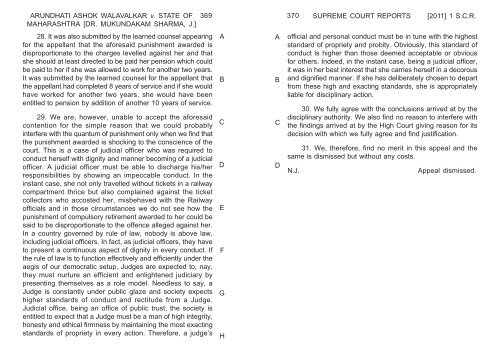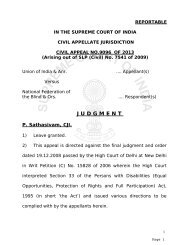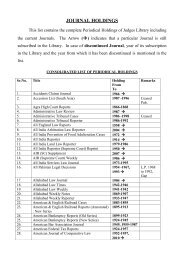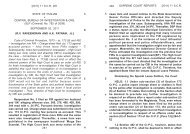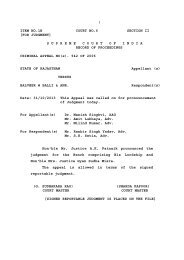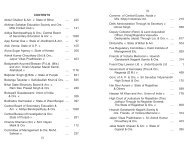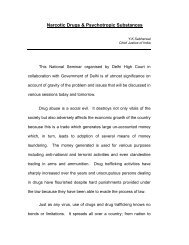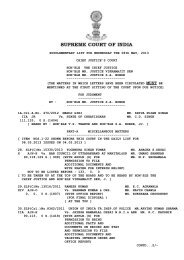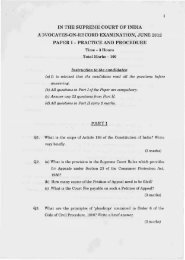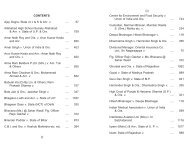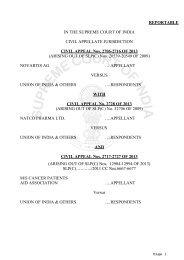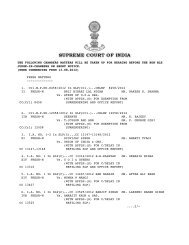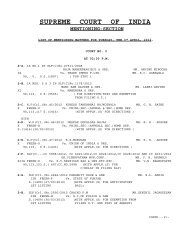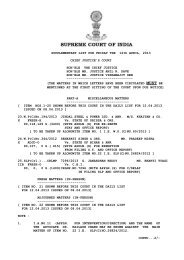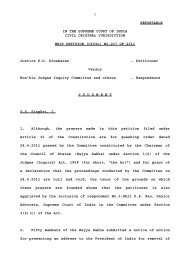Part No.II - Supreme Court of India
Part No.II - Supreme Court of India
Part No.II - Supreme Court of India
Create successful ePaper yourself
Turn your PDF publications into a flip-book with our unique Google optimized e-Paper software.
ARUNDHATI ASHOK WALAVALKAR v. STATE OF<br />
MAHARASHTRA [DR. MUKUNDAKAM SHARMA, J.]<br />
28. It was also submitted by the learned counsel appearing<br />
for the appellant that the aforesaid punishment awarded is<br />
disproportionate to the charges levelled against her and that<br />
she should at least directed to be paid her pension which could<br />
be paid to her if she was allowed to work for another two years.<br />
It was submitted by the learned counsel for the appellant that<br />
the appellant had completed 8 years <strong>of</strong> service and if she would<br />
have worked for another two years, she would have been<br />
entitled to pension by addition <strong>of</strong> another 10 years <strong>of</strong> service.<br />
29. We are, however, unable to accept the aforesaid<br />
contention for the simple reason that we could probably<br />
interfere with the quantum <strong>of</strong> punishment only when we find that<br />
the punishment awarded is shocking to the conscience <strong>of</strong> the<br />
court. This is a case <strong>of</strong> judicial <strong>of</strong>ficer who was required to<br />
conduct herself with dignity and manner becoming <strong>of</strong> a judicial<br />
<strong>of</strong>ficer. A judicial <strong>of</strong>ficer must be able to discharge his/her<br />
responsibilities by showing an impeccable conduct. In the<br />
instant case, she not only travelled without tickets in a railway<br />
compartment thrice but also complained against the ticket<br />
collectors who accosted her, misbehaved with the Railway<br />
<strong>of</strong>ficials and in those circumstances we do not see how the<br />
punishment <strong>of</strong> compulsory retirement awarded to her could be<br />
said to be disproportionate to the <strong>of</strong>fence alleged against her.<br />
In a country governed by rule <strong>of</strong> law, nobody is above law,<br />
including judicial <strong>of</strong>ficers. In fact, as judicial <strong>of</strong>ficers, they have<br />
to present a continuous aspect <strong>of</strong> dignity in every conduct. If<br />
the rule <strong>of</strong> law is to function effectively and efficiently under the<br />
aegis <strong>of</strong> our democratic setup, Judges are expected to, nay,<br />
they must nurture an efficient and enlightened judiciary by<br />
presenting themselves as a role model. Needless to say, a<br />
Judge is constantly under public glaze and society expects<br />
higher standards <strong>of</strong> conduct and rectitude from a Judge.<br />
Judicial <strong>of</strong>fice, being an <strong>of</strong>fice <strong>of</strong> public trust, the society is<br />
entitled to expect that a Judge must be a man <strong>of</strong> high integrity,<br />
honesty and ethical firmness by maintaining the most exacting<br />
standards <strong>of</strong> propriety in every action. Therefore, a judge’s<br />
369 370<br />
A<br />
B<br />
C<br />
D<br />
E<br />
F<br />
G<br />
H<br />
A<br />
B<br />
C<br />
D<br />
SUPREME COURT REPORTS [2011] 1 S.C.R.<br />
<strong>of</strong>ficial and personal conduct must be in tune with the highest<br />
standard <strong>of</strong> propriety and probity. Obviously, this standard <strong>of</strong><br />
conduct is higher than those deemed acceptable or obvious<br />
for others. Indeed, in the instant case, being a judicial <strong>of</strong>ficer,<br />
it was in her best interest that she carries herself in a decorous<br />
and dignified manner. If she has deliberately chosen to depart<br />
from these high and exacting standards, she is appropriately<br />
liable for disciplinary action.<br />
30. We fully agree with the conclusions arrived at by the<br />
disciplinary authority. We also find no reason to interfere with<br />
the findings arrived at by the High <strong>Court</strong> giving reason for its<br />
decision with which we fully agree and find justification.<br />
31. We, therefore, find no merit in this appeal and the<br />
same is dismissed but without any costs.<br />
N.J. Appeal dismissed.


